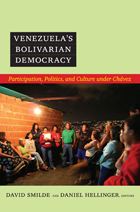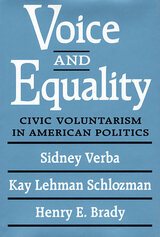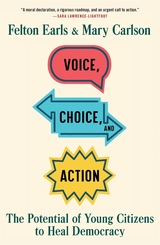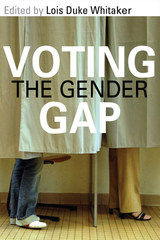5 start with V start with V

Contributors
Carolina Acosta-Alzuru
Julia Buxton
Luis Duno Gottberg
Sujatha Fernandes
María Pilar García-Guadilla
Kirk A. Hawkins
Daniel Hellinger
Michael E. Johnson
Luis E. Lander
Margarita López-Maya
Elizabeth Gackstetter Nichols
Coraly Pagan
Guillermo Rosas
Naomi Schiller
David Smilde
Alejandro Velasco

This book confirms Alexis de Tocqueville’s idea, dating back a century and a half, that American democracy is rooted in civil society. Citizens’ involvement in family, school, work, voluntary associations, and religion has a significant impact on their participation as voters, campaigners, donors, community activists, and protesters.
The authors focus on the central issues of involvement: how people come to be active and the issues they raise when they do. They find fascinating differences along cultural lines, among African-Americans, Latinos, and Anglo-Whites, as well as between the religiously observant and the secular. They observe family activism moving from generation to generation, and they look into the special role of issues that elicit involvement, including abortion rights and social welfare.
This far-reaching analysis, based on an original survey of 15,000 individuals, including 2,500 long personal interviews, shows that some individuals have a greater voice in politics than others, and that this inequality results not just from varying inclinations toward activity, but also from unequal access to vital resources such as education. Citizens’ voices are especially unequal when participation depends on contributions of money rather than contributions of time. This deeply researched study brilliantly illuminates the many facets of civic consciousness and action and confirms their quintessential role in American democracy.

Examining the work of social justice groups in Minneapolis following the 2008 recession
Since the Great Recession, even as protest and rebellion have occurred with growing frequency, many social justice organizers continue to displace as much as empower popular struggles for egalitarian and emancipatory change. In A Voice but No Power, David Forrest explains why this is the case and explores how these organizers might better reach their potential as advocates for the abolition of exploitation, discrimination, and other unjust conditions.
Through an in-depth study of post-2008 Minneapolis—a center of progressive activism—Forrest argues that social justice organizers so often fall short of their potential largely because of challenges they face in building what he calls “contentious identities,” the public identities they use to represent their constituents and counteract stigmatizing images such as the “welfare queen” or “the underclass.” In the process of assembling, publicizing, and legitimating contentious identities, he shows, these organizers encounter a series of political hazards, each of which pushes them to make choices that weaken movements for equality and freedom. Forrest demonstrates that organizers can achieve better outcomes, however, by steadily working to remake their hazardous political terrain.
The book’s conclusion reflects on the 2020 uprising that followed the police killing of George Floyd, assessing what it means for the future of social justice activism. Ultimately, Forrest’s detailed analysis contributes to leading theories about organizing and social movements and charts possibilities for further emboldening grassroots struggles for a fairer society.

Compiling decades of fieldwork, two acclaimed scholars offer strategies for strengthening democracies by nurturing the voices of children and encouraging public awareness of their role as citizens.
Voice, Choice, and Action is the fruit of the extraordinary personal and professional partnership of a psychiatrist and a neurobiologist whose research and social activism have informed each other for the last thirty years. Inspired by the 1989 United Nations Convention on the Rights of the Child, Felton Earls and Mary Carlson embarked on a series of international studies that would recognize the voice of children. In Romania they witnessed the consequences of infant institutionalization under the Ceaușescu regime. In Brazil they encountered street children who had banded together to advocate effectively for themselves. In Chicago Earls explored the origins of prosocial and antisocial behavior with teenagers. Children all over the world demonstrated an unappreciated but powerful interest in the common good.
On the basis of these experiences, Earls and Carlson mounted a rigorous field study in Moshi, Tanzania, which demonstrated that young citizens could change attitudes about HIV/AIDS and mobilize their communities to confront the epidemic. The program, outlined in this book, promoted children’s communicative and reasoning capacities, guiding their growth as deliberative citizens. The program’s success in reducing stigma and promoting universal testing for HIV exceeded all expectations.
Here in vivid detail are the science, ethics, and everyday practice of fostering young citizens eager to confront diverse health and social challenges. At a moment when adults regularly profess dismay about our capacity for effective action, Voice, Choice, and Action offers inspiration and tools for participatory democracy.

This book concentrates on the gender gap in voting--the difference in the proportion of women and men voting for the same candidate. Evident in every presidential election since 1980, this polling phenomenon reached a high of 11 percentage points in the 1996 election. The contributors discuss the history, complexity, and ways of analyzing the gender gap; the gender gap in relation to partisanship; motherhood, ethnicity, and the impact of parental status on the gender gap; and the gender gap in races involving female candidates. Voting the Gender Gap analyzes trends in voting while probing how women's political empowerment and gender affect American politics and the electoral process.
Contributors are Susan J. Carroll, Erin Cassese, Cal Clark, Janet M. Clark, M. Margaret Conway, Kathleen A. Dolan, Laurel Elder, Kathleen A. Frankovic, Steven Greene, Leonie Huddy, Mary-Kate Lizotte, Barbara Norrander, Margie Omero, and Lois Duke Whitaker.
READERS
Browse our collection.
PUBLISHERS
See BiblioVault's publisher services.
STUDENT SERVICES
Files for college accessibility offices.
UChicago Accessibility Resources
home | accessibility | search | about | contact us
BiblioVault ® 2001 - 2024
The University of Chicago Press









